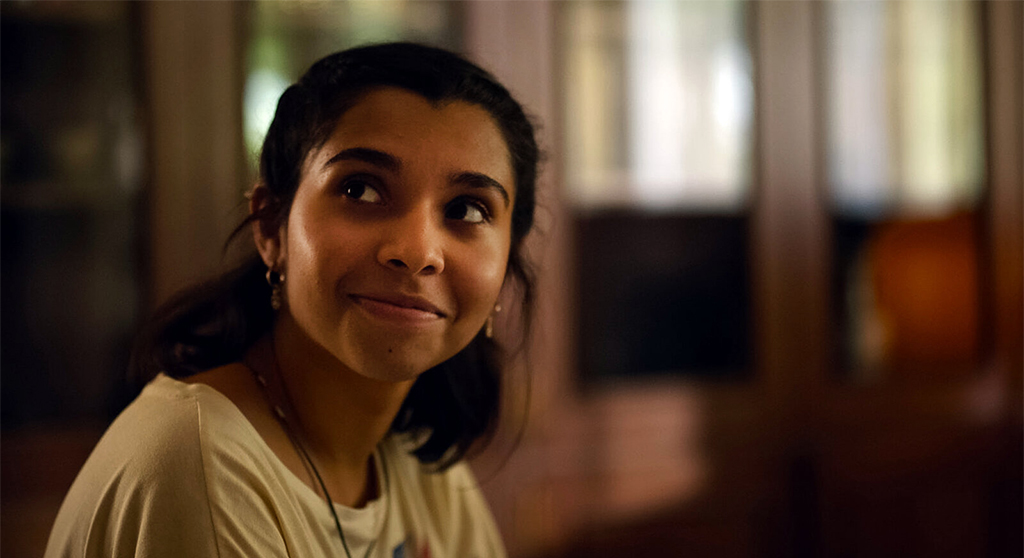‘Housekeeping for Beginners’: Sometimes family is your gay husband, his lover and your dead girlfriend’s daughters
![]()
“Housekeeping for Beginners” is an ode to chosen family written, directed and edited by the Macedonia-born, Australia-raised Goran Stolevski. It’s a deep look into what it means to love and care for others, no matter who they are or how they found their way to you.
Set in North Macedonia, the film begins in the home of Dita (Anamaria Marinca), where she lives with her girlfriend Suada (Alina Serban), their gay roommate Toni (Vladimir Tintor), Suada’s daughters Vanesa (Mia Mustafi) and Mia (Dzada Selim), and Elena (Sara Klimoska), Flora (Rozafë Çelaj), and Teuta (Ajshe Useini), a tangle of young lesbians who feel like slightly random inclusions in the inner cast but serve to demonstrate Dita and Suada’s home as a kind of refuge. When the movie starts, the already full house has just gained another member, Ali (Samson Selim), Toni’s latest hookup who has spent the entire day there (assumedly because he has nowhere else to go) and made fast friends with the teenaged Vanesa and the 5-year-old Mia.
The harried social worker Dita, further harried by learning Suada has terminal pancreatic cancer, is just about at her wits’ end when she returns home to find him there. Still, dinner is put on the table for everyone, without question: This is the way of their world. Dialogue flies as they dine, a show of the cast’s chemistry as jokes are made and insults tossed. The chaos is a fitting backdrop for a film that continues to be, as a baseline, etched with stress and at times deeply intense.
There’s no real scene-setting, no crash course in North Macedonian history. The hierarchy is established through bits and pieces of dialogue and subtle references: Toni is Macedonian and Dita is Kosovan, putting them higher on the North Macedonian ladder than Suada, her daughters, and Ali, who are all Romani. But in a sense, they’re all on the bottom, because they’re all queer.
Just before Suada dies, she makes a desperate and heartbreaking plea to Dita to “be their mother” and to help Vanesa and Mia be considered white, terrified of what their lives could look like. But gay people are banned from adoption in still fairly homophobic North Macedonia, so Dita “marries” Toni against his will to be able to legally care for Vanesa and Mia – in the end he kinda comes around, pretending half-heartedly that he hasn’t.
It sounds grim, but blossoms into uplift with a healthy dose of humor. The most challenging of the relationships is between the well-meaning Dita and rebellious Vanesa, who ends up with her head in the toilet twice over the course of the 107-minute film, but even they learn to (sort of) understand each other, with several moving scenes near the end. This isn’t a utopian story – but that’s why it works. It’s realistic, and therefore fiercely believable.
Some of the action takes place in Shutka, where Ali, Suada and the girls are from. A short ride from the capital city Skopje, where most of the film is set, Shutka hosts the largest concentrated Roma population in the world. The film deals with the tension between white Macedonians and Romanis in the same way it does with LGBTQ+ tensions in the countries: tastefully, but with realistic honesty.
The whole cast is up to the task, but Samson Selim delivers a standout debut performance as Ali, the unassuming newcomer whom everyone grows to love. He registers as a remarkably tranquil presence, especially during the first half of the film. On his first night, when a door slams, he straightens a framed photo shifted by the impact. The simple action connotes something profound about the nature of his character and the environment he has landed in. His chemistry with the young Dzada Selim, who plays the exceptionally cute Mia, is especially poignant. Watching her learn to trust him in the wake of grief is one of the most compelling parts of the film. Mustafi plays the totally-over-it, can’t-be-bothered teen perfectly, and her tender moments with Dita and others end up being quite touching.
Amid endless cigarettes and constant noise, something truly beautiful emerges. An absolutely worthwhile whirlwind of a watch, “Housekeeping for Beginners” is a gritty yet compassionate portrait of queer solidarity and resilience, and a moving story about figuring out who we call family with a strong undercurrent of love throughout.
- At Landmark Kendall Square Cinema, 355 Binney St., Cambridge.



